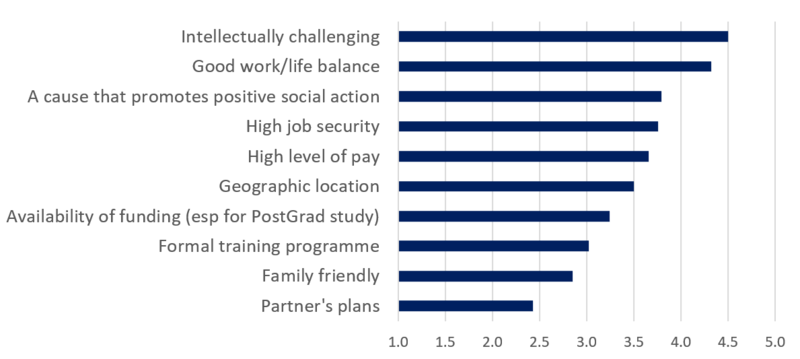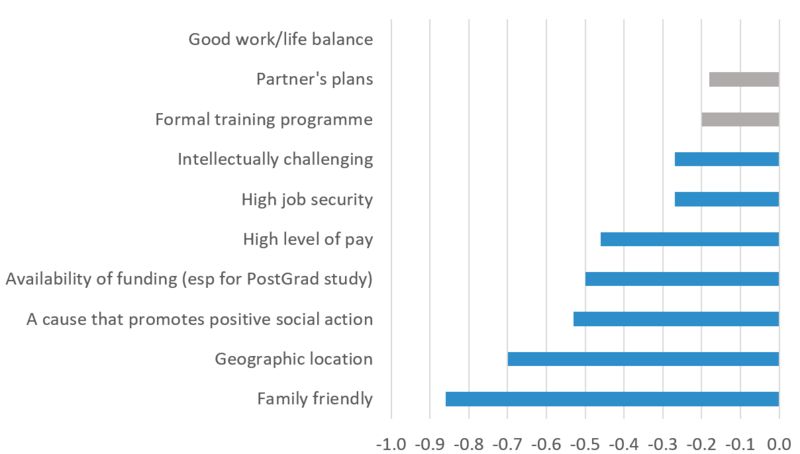In March 2020, we ran a survey of undergraduates at Oxford University to find out if and how the Covid-19 pandemic was starting to have an impact on their career planning. In May 2021 we repeated the survey to understand if there has been any difference between students' views at the start of the pandemic and now.
Methodology
Participation in the survey was voluntary, and all students were invited to take part. Invitations to take part were sent directly to all students, with a link to an online form. The only personal data collected in the 2021 version was the year group (eg, first year, second, penultimate, finalist). Core question text on the features of a job was identical in both surveys, and answers were invited on a 6-point Likert scale. This ranged from “Not important,” scored 1, to “Essential,” scored 6. Extra questions related to the pandemic and return to work were rated on an 11-point Likert scale from 0=No change to 10=Complete change, or 0=all working at home, to 10=all working away from home.
In 2020, there were 808 responses, and in 2021, 218 responses; these were not necessarily the same students in each sample. Results were coded and analysed in SPSS.
Results
There has been a modest change to careers plans because of the pandemic, but no change between a year ago and now.
Q 1: Overall, how much have you changed your career plans, because of the COVID-19 pandemic? (0=none to 10=completely)
Mean score is 3.4, standard deviation of 2.9, compared with mean 3.7, std dev 3.1, in 2020. This is not a statistically significant difference (p=0.18). It is somewhat of a bimodal distribution (see chart), with about 25% of the respondents citing No change.

What effect has the pandemic had on your career plans? 2021, n=218
Four of the characteristics of an ideal job have changed from a year ago:
- a small increase in the importance of “good work/life balance”
- small declines in the importance of “geographic location,” “partner’s plans,” and “availability of post grad funding.”
These are all statistically significant changes, the other six characteristics remain unchanged.
Q 2: How important are each of the following characteristics of a job in your choice of career? (Scale of 1 “Not important” to 6 “Essential”)
The chart below shows the score for each characteristic in 2021.

Characteristics of an ideal job 2021, n=218
The same question was asked in 2016; the importance of seven of the ten characteristics have changed between 2016 (n=303) and 2021 (n=217). Clearly these questions were posed to completely different cohorts of students but in that period, the mean overall score declined from 3.9 to 3.5 out of a potential 6.
All characteristics have not declined. “Good work life balance” has the same score, in the two surveys five years apart – against the overall decline, we infer a relative increase in the importance of this factor. The chart below shows the change in score, orange bars are statistically significant differences.

Change in mean score between 2016 and 2021
Finally, in 2021 we asked the students about their desired place of work.
Q 3: Thinking ahead, what proportion of your time would you ideally like to be working in an office/factory/field (vs home)?
On a scale of 0 (Fully working from home) to 100 (Fully in the office), the mean score is 66.
Summary
A year ago, we asked undergraduates if they were rethinking their career plans because of the pandemic, and we’ve just asked them again. We found that the answer is, “yes, a little.” On a scale of 0 (no change) to 10 (all change) the average score was 3½, and that hasn’t changed since last year.
Students also told us what’s important in finding a job: intellectual challenge and good work/life balance are the top two requirements – no change from last year – closely followed by jobs that offer positive social action, good security, and high pay. Finally, students would rather work mostly in the office than at home. On a scale of 0 (all at home) to 10 (all in the office), the score was 6½.